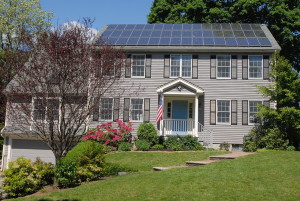Solar energy is thriving in the commonwealth of Massachusetts, but the clean energy trend has slowed considerably due to the current cap on solar net metering. Contributing to the decrease is the imminent expiration of Federal incentives for installation of solar energy. Solar net metering allows customers who generate their own electricity from solar power to feed their surplus into the grid, calculated as a percentage of peak electrical usage.
Solar Net Metering Caps Create Backlog
The current caps particularly affect the MetroWest service grid, which is already buying back the maximum amount of solar-produced electricity produced by commercial customers required by state law. This situation has created a waiting list of commercial customers who would like to install solar panel systems but are delaying installation until the caps are raised to make the projects economically viable.
Local business leaders have expressed hope that the solar net metering caps will soon be raised. In late June, the Massachusetts Senate voted 37–0 to raise the caps to 1,600 megawatts, up from the current caps of 1,000 and accounting for approximately 4–5% of the total energy generated statewide. The decision was passed as a part of a larger climate change preparedness bill. Another positive indicator is Governor Charlie Baker’s recent announcement that he plans to file legislation regarding the caps.
Solar Detractors Speak Up
Not everyone is in favor of the solar initiative. Associated Industries of Massachusetts has spoken out against the Senate’s move, indicating it could add up to $600 million to the total electric bills of Massachusetts customers who do not have access to solar power. The group has indicated a lift in the solar net metering caps would only put money back into the pockets of the companies installing the solar arrays. Solar advocates say that AIM did not take into consideration the benefits associated with solar energy and merely weighed the up-front costs. Massachusetts has the fifth highest electricity cost in the continental United States.
Unless the Federal government acts, incentives for businesses that adopt solar energy systems will be scaled down in December 2016 and Federal incentives for residential projects will be eliminated. The incentives have spurred the Massachusetts solar industry as the state ranked second in 2014 with 9,400 solar industry jobs. The cost of installing solar arrays has come down in recent years, making them more feasible even without incentives.
Although the initial cost of installation has gone down, solar supporters advocate that it is still too early to remove government incentives as a motivating factor.





